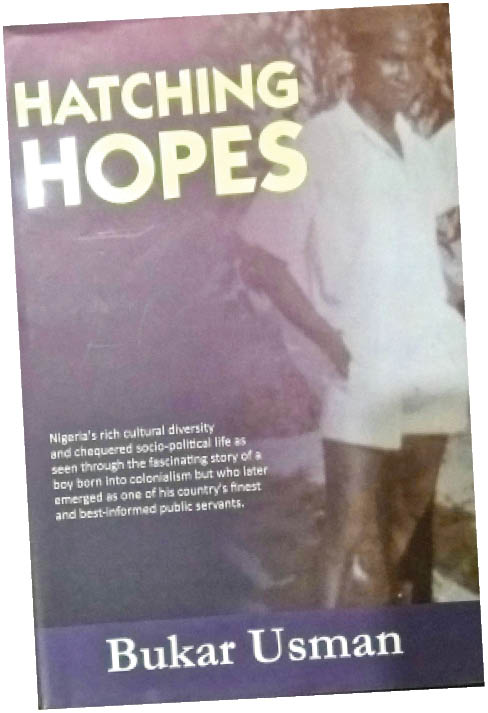One man’s story and a nation’s journey to democracy
Title: Hatching Hopes Author: Bukar Usman Publisher: Bookcraft & Klamidas PAGES: 287 Reviewer: Khalid Imam Not all nonfictional accounts are strictly personal. A good number of autobiographies, memoirs and biographies, not necessarily of notable political figures, religious leaders, heroic military men or great warriors, famous entertainers, erudite intellectuals, preeminent poets […]

Title: Hatching Hopes
Author: Bukar Usman
Publisher: Bookcraft & Klamidas
PAGES: 287
Reviewer: Khalid Imam
Not all nonfictional accounts are strictly personal. A good number of autobiographies, memoirs and biographies, not necessarily of notable political figures, religious leaders, heroic military men or great warriors, famous entertainers, erudite intellectuals, preeminent poets and novelists have the magnetic force and valuable information to tell splendid public stories. This is largely so, because there are many personal stories of other people such as leading technocrats, journalists, economists, bankers and teachers which may also reflect significant epochal occurrences in their lifetime or during their public service years. True, twists and turns of a great number of major national histories, transformations and political events, don’t just happen, there are personalities behind them. Knowledge and history would surely be incomplete without reading from such persons’ narratives being drivers of change, events and transformations.
It is not hard to understand that the wellbeing of all nations is radically shaped or moved by the lives of individuals as drivers or participants. And whenever such persons narrate their tales, their personal stories reveal quite a number of major public stories. Why is it so? It is simple to accept that people who had the rare privilege to be active participants in formulation or implementation of intricate or key national policies or reforms are the true architects with hands behind most of the socio-economic life, political, religious and multi-cultural experiences of their countries, continents or the world as a whole.
‘Hatching Hopes’ is a thrilling story of one of such influential but utterly invisible architects named Dr. Bukar Usman. This gripping autobiography starts by narrating a captivating tale of the Babur/Bura speaker born at a time the inhabitants of his northeastern birthplace, Biu town, were still sharing space with hyenas the neighborhood hills and plateaus surrounding their agrarian village. The hyenas, as the narrator would recall were then living in the nearby hideouts in the mountains sitting by the foot of their huts and farms.
The boy Bukar, like most of the few schoolchildren of his generation, was not enrolled in a Western school by his parents. Rather, he was “arrested” in 1951 by a man “wearing a dull, multi-coloured gown” (p. 25). The brave boy showed no fear or resistance to the strange man who picked him on the street while he was playing. Eventually, the man turned out to be one of the emir’s messengers taking children old enough to enroll in school. The emir wasted no time instructing that Bukar and one other boy named Mamman Tukshil should be taken to school. And “nobody sought the permission of my parents nor was that required” (p. 26). Since the emir’s power was absolute, little Bukar and the other boy were taken straightaway to school.
It was that very singular royal instruction that set him off on the path of a new beginning, one that culminated into a glorious public service after schooling at King’s College, Lagos (pp.57-66) and graduating from Ahmadu Bello University, Zaria. (p. 67). It is not out of place to note that, at that material time, Bukar was first taken to primary school, in the Muslim northern Nigeria, were parents not only preferred enrolling their children into Qur’anic schools, but considered Western education as a serious taboo, partly out of fear of the activities of foreign missionaries in most of the major traditional African societies. The Western schools, to the Muslim natives, were nets set to trap new converts for the white man’s religion.
The author takes the reader through segments of his fascinating life. For instance, one reads about his “early role models”(p.115), his “Lagos lifestyle” (p.123), his days working at the “Cabinet office” (p.133), his “public interactions” (p.147), his “family beginnings” (p.153), “entrepreneurial spirit” (p.167) and “marital healing” (p.171). At home and at the regional level, the narrator shares with readers his roles in rights campaign and Nigeria’s leading role in watering the tree of the African Commission on Human and People’s Rights (ACHPR) in 1996 where he served as a delegate (p.179). While in chapter nineteen, the author invites the reader to read about his “different feasts” (p.185) and in chapter twenty, he reveals his journey “back to the familiar,” serving in numerous Presidential panels and committees such as Presidential Panel on National Security (p.193).
In the final analysis, this is a book about Bukar Usman as well as Nigeria’s journey to democracy and its leading role in bringing lasting peace and democracy in Africa from Balewa to General Abdulsalami’s days when the author finally exited the scene into a new life in retirement. This is a rich material for students and scholars interested in public service, politics and Nigerian history.
Khalid Imam is a bilingual poet, author and playwright based in Kano. He can be reached via his email: [email protected]
